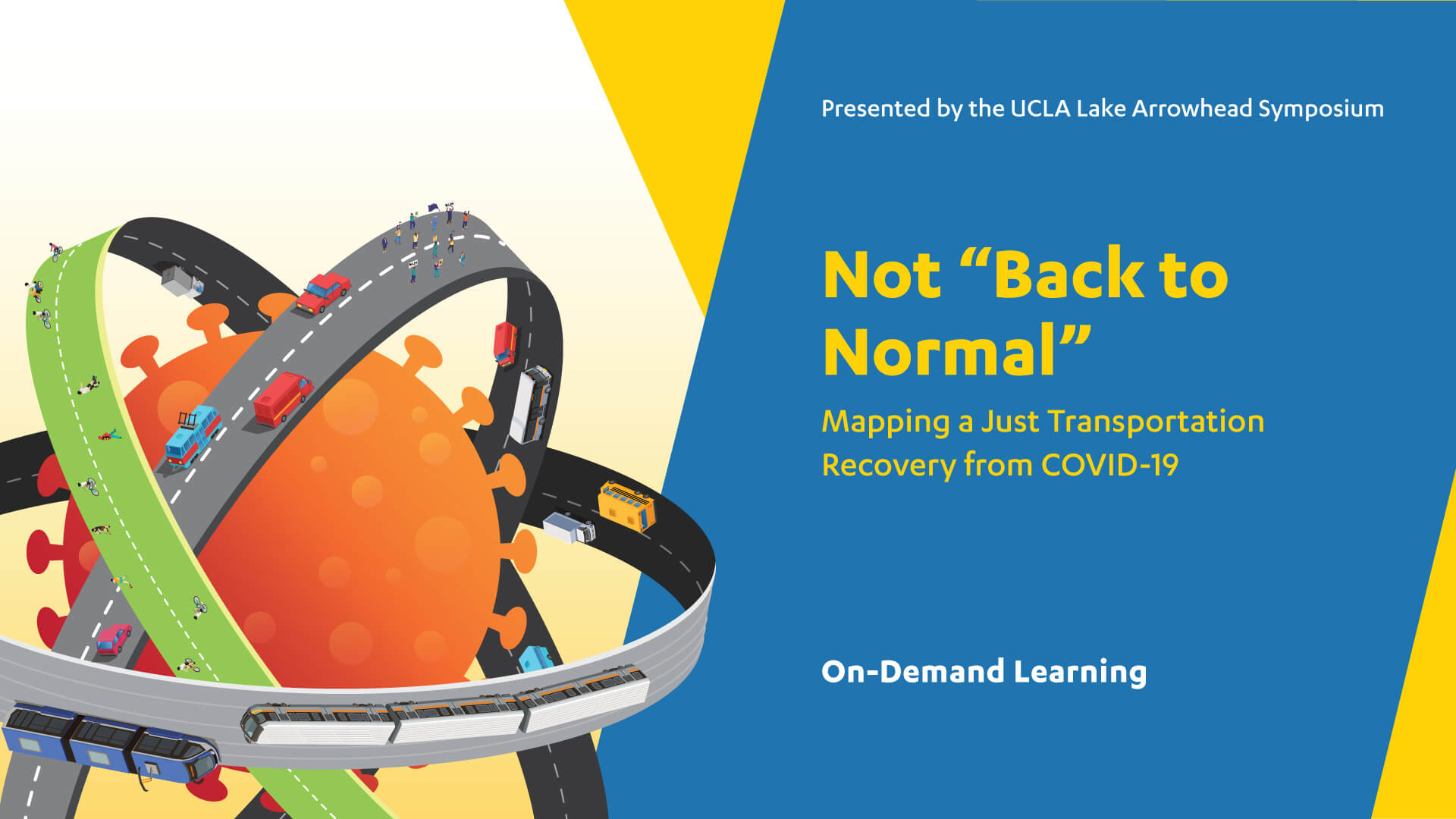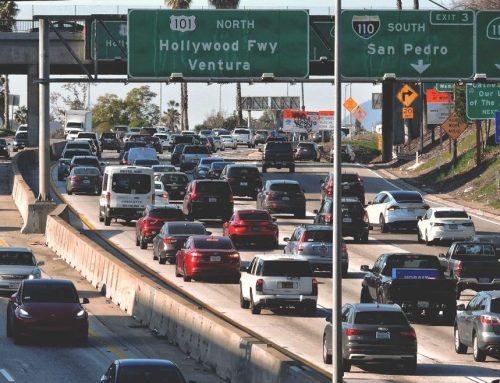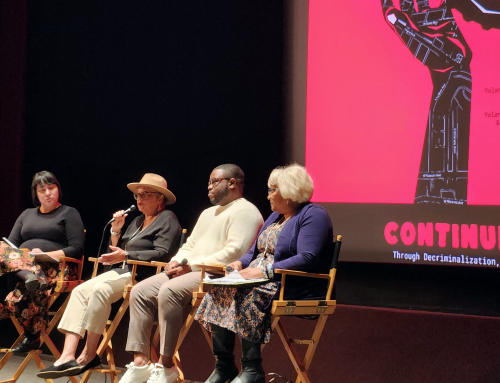The UCLA Institute of Transportation Studies recently held the virtual UCLA Lake Arrowhead Symposium focused on transportation conditions before, during and after COVID-19. During the 10 sessions, speakers addressed the struggles transportation agencies have faced in the current pandemic, along with systemic inequities in access to transportation and best practices for moving forward.
Event recordings are available for up to 13 hours of free on-demand AICP credits.
The UCLA Arrowhead Symposium hosts leaders and stakeholders from the public, private, nonprofit, and academic sectors for thoughtful discussion around the connections and conflicts between transportation, land use, and the environment.
Below is a recap of each of the Arrowhead sessions. If you missed any sessions, feel free to watch via the UCLA ITS YouTube channel.
Interested in professional development? The series can provide up to 13 hours of on-demand learning AICP CM credits. >>
How Can We Do Better? Limits on Black Mobility in Transportation (1.75 CM units)
Charles Brown, senior research specialist and adjunct professor at the Voorhees Transportation Center at Rutgers University, and Tamika Butler, Esq., founder of Tamika L. Butler Consulting, LLC., hosted a group of Black transportation professionals — Veronica Davis, co-founder of Nspiregreen, LLC; Nedra Deadwyler, CEO of Civil Bikes; Irene Marion, equity and inclusion manager at the City of Portland’s Bureau of Transportation; and Olatunji Oboi Reed, president and CEO of The Equiticity Racial Equity Movement — to discuss arrested mobility, or how policing of Black individuals affects economic, social and health outcomes of the Black community in the United States.
Mobility for Vulnerable Populations During COVID-19 (1.5 CM units)
Evelyn Blumenberg, director of the UCLA Lewis Center for Public Policy and professor of urban planning; Dr. Katherine Chen, a practicing primary care physician and a postdoctoral fellow in the National Clinician Scholars Program; and Stephen Wong, doctoral candidate and graduate student researcher at UC Berkeley, explored how COVID-19 has touched the most vulnerable populations, particularly through their mobility and access to critical resources like healthcare.
Air Quality, Safety, and Well-Being Consequences of Transportation Impacts (1.5 CM units)
A group of researchers including Offer Grembrek, lecturer at UC Berkeley and co-director of the university’s SafeTREC; Cesunica Ivey, assistant professor of chemical/environmental engineering at UC Riverside; Sang Hyouk Oum, applications program manager at UC Berkeley SafeTREC; and Madeleine Parker, Ph.D. candidate in city and regional planning at UC Berkeley, discussed impacts from the reduced travel during COVID-19. Each explored more specific conversations including air quality changes, adjustments to traffic safety, and changes to individual well-being.
Changing Trends in Travel Behavior – Will They Last? (1.5 CM units)
Three professors — Susan Shaheen, director of UC ITS California Resilient & Innovative Mobility Initiative and co-director of UC Berkeley’s Transportation Sustainability Research Center; Giovanni Circella, director of 3 Revolutions Future Mobility and senior research engineer at Georgia Institute of Technology; and Deborah Salon, associate director of TOMNET University Transportation Center and associate professor of transportation planning at ASU — examined how individuals have adjusted their travel for work, shopping and other trips. The speakers explored how these changes vary across income, race, occupation, and ethnicity, and whether they see them remaining once the pandemic has subsided.
Impacts to California Transportation Finance (1.5 CM units)
How will the reduction in travel during the pandemic affect transportation finance? Many agencies have seen reduced revenue from local option sales taxes, toll bridges, taxis and other sources. Given these reductions, Asha Weinstein Agrawal, director of the MTI National Transportation Finance Center and professor of urban planning at San José State University; Therese McMillan, executive director of the Bay Area’s Metropolitan Transportation Commission; Hilary Norton, chairwoman of the California Transportation Commission; and Chanell Fletcher, executive director of ClimatePlan, explored what transportation professionals can expect to see in the short- and long-term with their operation and capital budgets.
Transit’s Path to Recovery (1.5 CM units)
Public transit works best in dense communities where concentrations of people live, work and play. However, density is now antithetical to public health guidelines to protect the spread of COVID-19. This panel — featuring Darnell Grisby, CEO of TransForm; Brian Taylor, director of UCLA Institute of Transportation Studies and professor of urban planning and public policy; and Phillip Washington, CEO of LA Metro — reflected on how public health needs have affected demand and usage, and how that will impact transit moving forward.
Outreach to Co-Powerment: Achieving Transportation Justice through Reparative Planning and Engagement (1.25 CM units)
This fireside chat featuring Naomi Doerner, principal and director of equity, diversity, and inclusion at Nelson/Nygaard; Río Oxas, co-founder of RAHOK Consulting; and Dr. Destiny Thomas, founder and CEO of Thrivance Group, used storytelling and multimedia to highlight ways the government can perform collective outreach. The panel focused on collective visioning and critical power analysis, with calls to action for atonement and elevating the voices of those who have traditionally been exploited.
Advancing Equity through Agency Actions (1.25 CM units)
KeAndra Cylear Dodds, executive officer of equity and race at LA Metro; Jamario Jackson, senior community planner at TransForm; and Lateefah Simon, president of the board of the Bay Area Rapid Transit, gathered to highlight current and previous challenges agencies have faced in making mobility more equitable. Through their own work with or within the public sector, each speaker outlined ways agencies can achieve their equity goals and their specific roles in pursuit of equity and justice.
Advancing Environmental Justice and Climate Action (1.25 CM units)
The final panel of the conference explored climate change and the disproportionate pollution impacts on marginalized communities. Bernadette Austin, acting director of the UC Davis Center for Regional Change; Hana Creger, environmental equity program manager at The Greenlining Institute; and Nailah Pope-Harden, policy manager of ClimatePlan, detailed how advancing climate action and environmental justice is integral to recovering from COVID-19. What’s more, they advocated for connections between research advocacy and communities to directly address policy needs.





